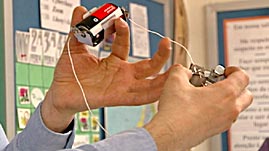Teachers' Domain - Digital Media for the Classroom and Professional Development
User: Preview

Source: WGBH Educational Foundation.


Science education involves teaching both content and scientific practices to students. So while topical knowledge is central to the understanding of science, skills in the science methods are equally important. To achieve this, students can benefit from real-world activities that provide the opportunity to engage with thoughtful scientific practices.
In the lesson shown in this video, Jeff Texeira challenges his students to make predictions about the effect of an electric current on a compass needle, bringing in concepts from earlier in the year.
In an effort to help them with this practice, Texeira has his students write down and discuss their predictions with the class. He also writes his students’ predictions on the board so the class can later reflect on them.
Integrating predictions into the lesson helps Texeira recognize gaps and consider how to teach the rest of the lesson. This approach also benefits the students by raising their awareness of the nature of scientific practices and their own approaches to them.
 Loading Standards
Loading Standards